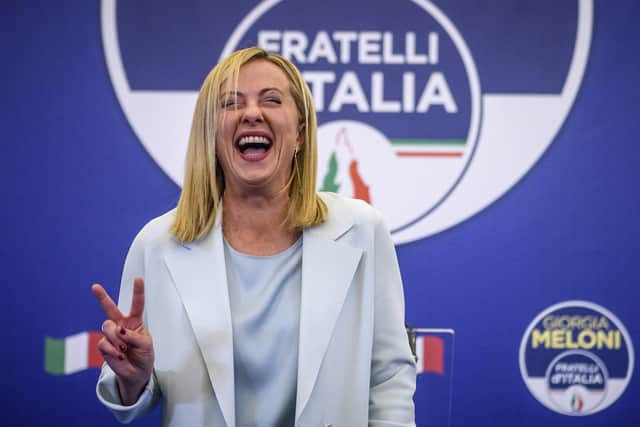Giorgia Meloni's Italy election victory: Whatever her true colours, she is a headache for the EU – Martyn McLaughlin
One of the most powerful nations in Europe, as well as a member of Nato and G7, will soon have at its helm a modern-day far-right leader in the form of Giorgia Meloni. It promises a dark and uncertain chapter in the country’s history, and the repercussions for the rest of Europe could be far reaching.
Only four years ago, the Brothers of Italy, the party Meloni has led since 2014, was a widely dismissed anomaly in Italian politics, having garnered a mere four per cent of the vote in the national elections.
Advertisement
Hide AdAdvertisement
Hide AdThis time around, it commanded 26 per cent of the total vote, with the right-wing coalition it spearheads taking 44 per cent in all. Speaking as the results came in, Meloni said her party would “govern for everyone” and would not “betray” the country’s trust. Time will tell.


The 45-year-old, who as a teenager joined Fronte della Gioventù, the youth wing of Italy's neo-fascist movement, and used her first ever broadcast interview to praise Mussolini, has attempted to present Brothers of Italy as a mainstream conservative force.
The party, she and her supporters insist, has more in common with the British Conservative movement than it does with Mussolini’s National Fascist Party or the Italian Social Movement that succeeded it.
In a video released last month designed to support such narratives and alleviate the fears of Italy’s allies in Europe, Meloni spoke in English, French and Spanish, insisting that “fascism has been consigned to history”.
But observers of Italian politics are not convinced. Indeed, many say her true intentions shone through during a rally in June in support of Vox, the right-wing Spanish party.
“There is no middle ground possible,” she said at the time. “Either say yes, or say no. Yes to the natural family, no to the LGBT lobbies. Yes to sexual identity, no to gender ideology. Yes to the culture of life, no to the abyss of death. Yes to the universality of the cross, no to Islamist violence. Yes to secure borders, no to mass immigration. Yes to the sovereignty of the peoples, no to the bureaucrats in Brussels. Yes to civilization, no to those who want to destroy it.”
It has been suggested that such fiery rhetoric is part of Meloni’s strategy to galvanise her base, and the fact she has come from nowhere to stand on the verge of becoming Italy’s first female prime minister is testament to her canny politicking. She has been able to win the support of extremists while purportedly distancing herself from them.
But a crucial point remains. She has never fully repudiated the neo-fascist nostalgia underpinning her party. Now that she is in power, the direction she takes Italy in is a source of growing consternation.
Advertisement
Hide AdAdvertisement
Hide AdThroughout her campaign, and indeed, her political career, Meloni has repeatedly and vehemently railed against the EU, describing it as an accomplice to “the project of ethnic replacement of Europe’s citizens”.
As part of their nationalist agenda, she and her coalition partners have demanded an end to mass migration, calling for the navy to turn migrants back to Africa, while emphasising the “Judeo-Chistian” heritage of Italy. She has also spoken out against granting citizenship to children born in Italy to foreign parents.
This brand of xenophobic cultural Christianity, promoted under the guise of ‘God, homeland and family’, will be music to the ears of others in Europe who have enjoyed recent electoral success on the back of such far-right ethnocentrism, such as National Rally in France, and the Sweden Democrats.
Indeed, given Italy commands the third largest national economy in the bloc, the significance of Meloni’s win could disrupt the EU at a time when it continues to wrestle the fallout of Russia’s war in Ukraine and an energy crisis that is having a ruinous socioeconomic impact.
Viktor Orban’s administration in Hungary and the ultra-conservative government in Poland have pulled at the democratic norms in Europe. Now, in Meloni, they have a powerful ally, especially when it comes to so-called EU ‘rule of law’ issues.
That, at least, is how it appears. The question of whether Meloni is an ideologue or a pragmatist is one only she can answer, and even if, as many hope, she curbs her wilder instincts, other far-right figures lie in wait.
In a political system so unstable that governments routinely collapse after just a year in power, the prospect of continued unity in the right-wing alliance led by Meloni seems optimistic.
Her coalition partners – Silvio Berlusconi, the 86-year-old convicted fraudster, and Matteo Salvini, the hard-right populist – have long been close to Putin, and the extent to which they will test Meloni’s support for Ukraine is one of the most intriguing – and troubling – issues to keep an eye on.
Advertisement
Hide AdAdvertisement
Hide AdTensions between Salvini and Meloni have simmered just beneath the surface for some time now. It may be the case that Meloni has already second guessed any challenges to come from the former interior minister, and is willing and prepared to consolidate her powerbase.
The price Italy and the rest of the EU may have to pay for that is unclear at this stage, but at some point, the real Giorgia Meloni will have to step forward.
Comments
Want to join the conversation? Please or to comment on this article.
